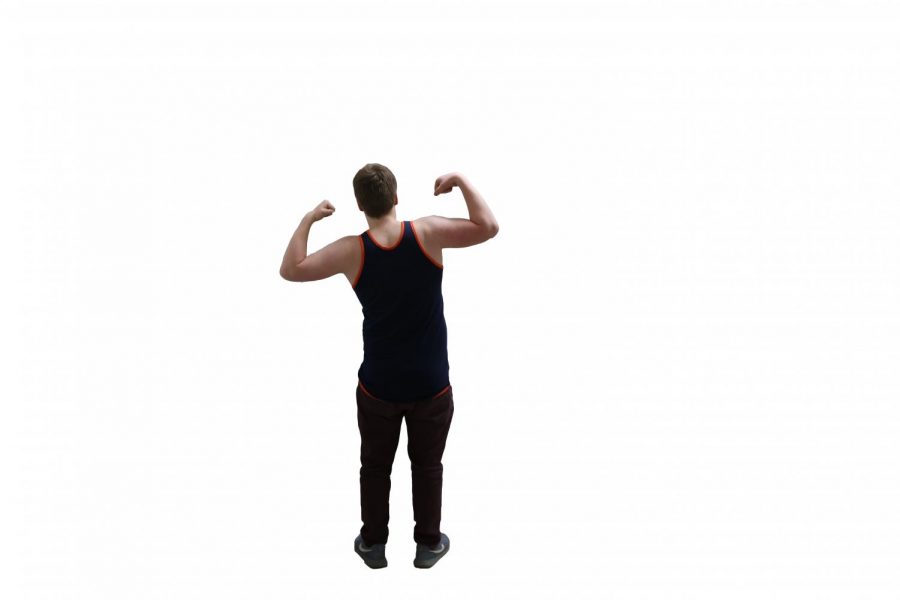Boys have body image issues, too
A black sweatshirt with a blue logo that puffs around your torso. A navy blue t-shirt that hugs your shoulders. A maroon collared shirt with a black vest that covers imperfections.
But no, you aren’t feeling it today.
So back to the black sweatshirt and the looser blue jeans. You close your closet after having tried on three outfits and make your way to school, a little disappointed at your lack of self-confidence.
You feel fat.
You walk through the halls, the image of happiness. But on the inside, you’re aware of every little movement you make, and every time you lift your arms or someone brushes against you, you feel exposed.
You feel weak.
In gym class, it’s fitness testing day. You whip out a respectable 35 sit-ups before collapsing onto the blue yoga mat. Right next to you, the boy-wonder-popular-jock pushes through 100 before the teacher asks him to stop. Your feelings of self-loathing are only increased by the locker room antics, where you hurriedly change in the corner while those around you have full-blown conversations, bare-chested. You rush home at the end of school and change into sweatpants and a t-shirt chosen specifically to hide anything you don’t like.
This may be you. It’s sometimes me. But you’re not alone.
Muscle dysmorphia, a common mental condition where you see yourself differently than others do, and other body image issues affect a lot more people than you might think. A research study conducted in 2014 by clinical psychologist Raymond Lemberg, as reported in the Huffington Post, found that out of every four people who suffer from an eating disorder, one of them is male. At least 30 million people of all ages and genders suffer from an eating disorder in the U.S, meaning that about 7.5 million men in the United States face this affliction. And that’s just specifically for eating disorders, not just body image issues in general.
Boys grow up often trying to fit the societal ideal of a perfect male body. The idea of bulky arms, six packs, toned chests and muscular backs has infested itself into the minds of those who should be spending time enjoying their youth. And it’s only getting worse.
Though still not as much as they should be, body image issues for women are talked about. Plus-sized women and what are deemed as “curvy” models are common social media gurus. The movement for female body empowerment has begun. But when was the last time you saw a plus-sized male model? When you walk into Urban Outfitters, H&M, or even Target, the walls are lined with large images of toned, smiling men, silently telling you to look like them.
I encourage you to try right now to name an action hero from the last five years who didn’t look like he could coach a CrossFit class. Chris Pratt stripped 60 pounds to take charge in his role as Peter Quill in the movie “Guardians of the Galaxy.” Dwayne “The Rock” Johnson’s hulking frame dominates from action movies to family flicks. As a result of these films, derogatory terms like “dad bod”, a male body type best described as soft and round, have become commonplace, stopping any sort of positive Hollywood discussion.
There are those who walk around the halls every day hating themselves, for not having his arms or their stomach. Psychology Today highlights a recent study published in the journal Pediatrics, reporting that 40 percent of boys in middle and high school exercise regularly — and 90 percent at least occasionally — with the specific goal of bulking up.
In today’s generation, we strive to tell young girls that no matter how much they weigh or how they look, they are beautiful. But it’s a double standard to not extend those same sentiments to those of the opposite sex.
Societal views of the perfect body have drastically changed over time. In the Gilded Age, those with a chubbier frame were considered the height of wealth and perfection, while the early 1970s had a much bigger appreciation for those with skinnier, lanky proportions.
However, there has never been a time where the pressure to look perfect has been greater than right now, with social media and constant Hollywood updates infiltrating our everyday life. The time to talk, to let people know they aren’t alone, is now.
After all, it’s just as hard to be Ken as it is to be Barbie.

I am thrilled to be Features Editor for DOI in my second year on staff; outside of DOI, I am an active member of the theatre department, on the executive...

I am a senior and this is my first year on staff as a staff writer. I have been a Link Crew leader since last year and will be trying track this spring!





